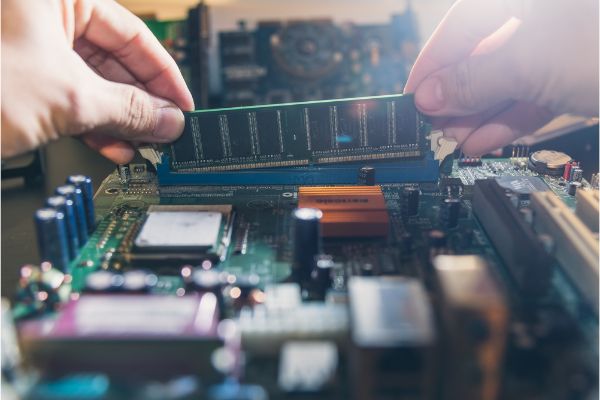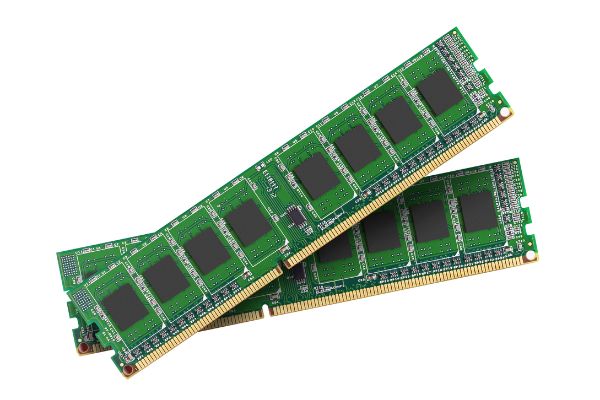Disclaimer: This post may contain affiliate links, meaning we get a small commission if you make a purchase through our links, at no cost to you. For more information, please visit our Disclaimer Page.
Whenever people want to buy new computers, one of the essential aspects they consider is the RAM- random access memory. It gives apps a place to store and access data impermanently. The RAM of a computer determines its quality as more RAM implies better performance.
All computers have a maximum RAM capacity. A PC has an upper memory limit that dictates the size of its RAM, and if you surpass the limits, nothing disastrous will happen. Some motherboards have fixed memory size for every slot, and exceeding it leads to a failure in system functionality.
Table of Contents
Can You Have Too Much RAM In A PC?
A computer’s operating system, motherboard, and operating system determine the maximum amount of RAM it can support. You can have too much RAM on your PC. Unlike older computer versions, those in the market today can support more RAM than they have in the memory slots.
Recently manufactured computers have 64-bit processors expected to support 18 exabytes. Even so, most operating systems limit the RAM to 128 GB. Old versioned motherboards with 64-bit processors can only support 64 GB, 16 GB, or 8 GB RAM.
It is practicable to add more RAM to a computer when running slowly. Installing more RAM can speed up your PC, making it much more convenient to use; this is because the extra random-access memory will store some of the data on the memory sticks.
There are other numerous upgrades you can make on your computer to enhance its performance. For instance, you can update the hard drive.
Another easy way to fasten the speed of a PC is by lessening the RAM usage. You can do this by accessing the activity monitor on your Mac computer or a task manager in windows to establish the programs that use up much RAM and close the ones you don’t frequently use.
Is 32GB Too Much RAM?
The ideal size of RAM a person needs depends on the activities they carry out on their PC. Some individuals use their computers for light activities like checking and replying to their mail or social media. On the other hand, some use their PC for gaming or video editing. These individuals cannot rely on the same RAM size.
32 GB is more than sufficient for most people. If you are a lover of modern games and mostly use your PC for standard tasks, even an 8 or 16GB RAM will serve you perfectly.
Even though most people recommend 16 GB for gamers, those who want a more pleasant experience go for 32 GB RAM.
It can be quite tricky to tell the size of RAM that will serve you appropriately. Most people opt for 32 GB, so they don’t run out of RAM.
Hence, 32 GB is not too much RAM depending on the purpose it serves- people want to engage in any activity without worrying about lessening their RAM usage or installing more RAM.
Is 64 GB RAM Too Much?
To many, 64 GB RAM is too much as it is significantly more than needed. Ideally, most laptops use about 4GB of RAM per day. Even gamers who spend most of their time on their PC can do okay with just 16 GB or 32 GB for future-proofing.
Nonetheless, that does not mean that people should not go for it because if it weren’t serviceable, it would not have been invented in the first place. There are specific tasks befitted for 64 GB RAM.
This RAM IS best suited for video editing and running virtual machines. However, a time is coming when 64-GB RAM will not be sufficient for certain activities. Most people may not need it now, yet some professions or activities will gradually become complex.
Professional software designers and video editors often have a complex workflow that is exacting and can slow down a computer’s speed. An 8, 16, or 32 GB RAM is highly inadequate unless they handle lower Poly models or Lower resolution videos.
Therefore, you only need 16 or 32 GB RAM if you go overboard for personal use; 64GB is meant for professional use. Yet, there is no harm in going for a large RAM processor, but this relies on the type of computer you get.
What Happens if You Have Too Much RAM In A PC?
Contrary to many beliefs, the size of a computer’s RAM rarely affects its serviceability unless the tasks being carried out are more complex than the available RAM. Of course, you may have much more RAM than you need; still, in other cases, excessive RAM does not hinder a computer’s performance.
In some PCs, the RAM becomes unstable because more sticks are available. To avoid this, you can check on the maximum memory a motherboard can support from your device’s manual.
Some motherboards can sustain excessive RAM since nothing happens to the computer’s serviceability if you do not use up the RAM. Some computers will fail during the power-on self-test, but others will inform you of the excessive memory yet keep working as expected.
Many individuals may fail to research the ideal RAM size for them and buy computers that should serve people handling complex tasks. It is essential to ask for the help of professionals when buying a computer, that way, you will end up with the RAM size you need.
What Kind of Ram Should I Get?
As you already know, RAM is crucial for every computer system as it is more of a buffer between the CPU and traditional storage. Hence, to be on the safe side, it is best to establish the RAM size that serves you well because what works for another may not be exemplary for you.
There are many ways you can determine the kind of RAM to get. For instance, what do you intend to do on your PC? To select the right RAM for your system, consider the voltage, timings, frequency, bit, capacity, speed, pricing, and warranty.
There are varying types of RAM in the market, so size is not the only thing to scrutinize. The DDR RAM and DDR2 RAM are outdated. The current standard RAM is quite affordable and has higher capacities; DDR3 RAM. The latest is the DDR4 RAM which has a higher capacity than DDR3.
A computer’s motherboard can only support certain frequencies, so you will negatively impact your system performance if you go for slow memory. At the same time, a faster memory may also fail to work completely.
Some RAMs necessitate voltage that is not above the common standard. So a good RAM is one in which the motherboard can supply the required voltage amount. 64-bit is recommendable for people with 4 GB Ram or more, but 32-bit only befits less than 4 GB computer memory.
Some of the best RAMS for gaming include G.Skill Trident Z5 RGB DDR5-6000, Patriot Viper Steel DDR4-4400, and Corsair Vengeance RGB Pro DDR4-3200.
In closing, the best RAM you can get depends on your needs, and it is up to you to research the available RAMs so you know which one to get.


